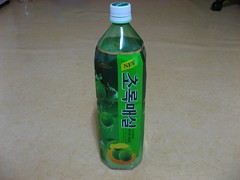 After we ran out of our supply of maeshilcha ('매실차') in early March, I managed to minimise my withdrawal symptoms by buying bottles of I Can't Believe It's Not Maeshil from the supermarket. OK, this isn't the actually brand name, but compared to the thick home-made version which Korean Mother cooks up annually, it's a poor imitation. To be fair it's more of a juice than a concentrated tea, but it doesn't give you quite the same kick.
After we ran out of our supply of maeshilcha ('매실차') in early March, I managed to minimise my withdrawal symptoms by buying bottles of I Can't Believe It's Not Maeshil from the supermarket. OK, this isn't the actually brand name, but compared to the thick home-made version which Korean Mother cooks up annually, it's a poor imitation. To be fair it's more of a juice than a concentrated tea, but it doesn't give you quite the same kick.
Now it's a bit early in the season for Korean Mother to cook up her annual batch of all-purpose ingredient and side-dish mixture of which maeshiljeub ('매실즙') (and in turn maeshilcha) is a by-product, but because we're planning to head back to England for a few months in October. she's taken it upon herself to do it particularly early this year. Even so, with a fermentation time of three months I doubt we'll be drinking too much of it before we leave.
Our task this morning was to buy the sugar which is poured into a large container with the helpless meashil (or Japanese apricots) are first emptied into. This helps the fermentation process. But clearly, there's been a small cultural misunderstanding, because where I come from 'some sugar' does not mean ten kilograms of the stuff, and when someone tells me that maeshilcha contains 'some sugar', I don't expect that to mean 50%. I must have spent half the winter on a sugar high - no wonder I've not been getting the same 'refreshing feeling' from the supermarket juice. I think I've gone off the whole idea now.
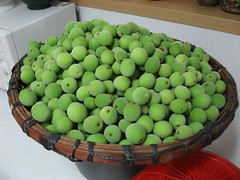
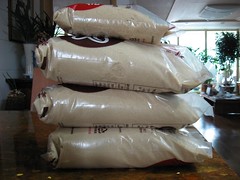
Because it's so early in the season, Korean Mother had gone to a farm to buy the fruit especially early, so there was no backing out. Armed with the sugar we arrived at her apartment to witness the maeshiljeub making tradition. Out came a large container, and in went the fruits and sugar in equal proportion, a couple of inches worth of each at a time. And disappointingly, that was it. So now we wait. Three months during which it will slowly transform itself from a bright green/sandy coloured mixture into a dark brown sludge. I may take occasional picture updates of its progress but I think I'll forego the chance of becoming an Internet sensation by hooking up a webcam to monitor it.
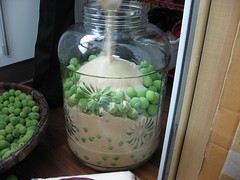
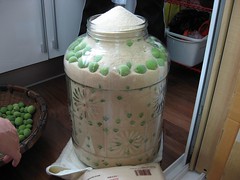
So if the 0530 salt seller is too much, perhaps our old nemesis Paris Baguette merely broadcasting its propaganda in a shopping district throughout the day is more acceptable? No, not really. Often they just stick speakers outside Paris with some half-dressed girls (leggy 16-year-olds sell bread it seems), but I noted that the one in the Nampodong district had its public address system properly installed above the sign - audible from half-way down the street no less. Take note - one day everyone in Korea will do this as we lurch inexorably towards that dystopian future run by 'marketing-led' companies. I'd probably buy their bread anyway, I don't know why the Stalinist sales technique has to be employed. Maybe this is what happens when political indoctrination experts move into the commercial sector. Speaking of which, British Nationalism is alive and well in Korea, in large part thanks to the efforts of German-owned Reebok and Korean chain Ask Enquired, which are responsible for the large number of Union Flags on clothing I walk past in the street every day. The Nampodong branch is home to the largest flag I've seen so far. Oddly enough if you did this in England I'd give it a week before your shop window is put through.
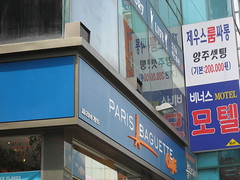
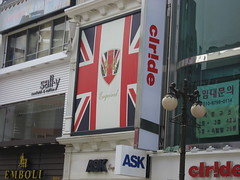 A shopping trip in Korea can quickly become an even more surreal affair for the English speaker as you are exposed to ever more bastardisations of the language. I have this nightmare that I stay here too long and when I get back to England all I can speak is Konglish. So what 'Mannish Elegance' exactly means for a women's clothing store remains a mystery, and while I think I agree with the sentiments behind the t-shirt which reads 'In your carears you will meet many peeple. All are signilleant. They deserve you allantion.', it's more disturbing that I actually can understand the meaning at first glance. My wife bought a t-shirt with Vivienne Westwood emblazoned across it., but I don't think she's lending her name to a 5,000 won (about £2.71) clothing line. And do we really believe that the store Jessi hails from New York? Occasionally you learn something though - Ford's rapidly declining brand still carries enough cachet here to be just about worthy of bragging about publicly, even if its exclusivity is largely due to trade barriers and the engrained 'buy Korean' mentality.
A shopping trip in Korea can quickly become an even more surreal affair for the English speaker as you are exposed to ever more bastardisations of the language. I have this nightmare that I stay here too long and when I get back to England all I can speak is Konglish. So what 'Mannish Elegance' exactly means for a women's clothing store remains a mystery, and while I think I agree with the sentiments behind the t-shirt which reads 'In your carears you will meet many peeple. All are signilleant. They deserve you allantion.', it's more disturbing that I actually can understand the meaning at first glance. My wife bought a t-shirt with Vivienne Westwood emblazoned across it., but I don't think she's lending her name to a 5,000 won (about £2.71) clothing line. And do we really believe that the store Jessi hails from New York? Occasionally you learn something though - Ford's rapidly declining brand still carries enough cachet here to be just about worthy of bragging about publicly, even if its exclusivity is largely due to trade barriers and the engrained 'buy Korean' mentality.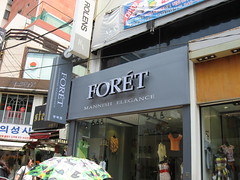

 At the opposite end of the spectrum Prada really does have cachet here, even if you can buy 'Prada' bags for 40,000 won (£21.68) from street vendors. Oddly enough it seems to do little to devalue the brand, perhaps only adding to the desire to own a bag where the badge is actually properly centred and level. Italian shoes are also an aspiration of sorts, but at 20,000 won (about £10.84) even more affordable, even if 'the Italians' have chosen some rather curious English text about Korea's economy which a little Google research reveals is lifted straight out of a Korea Herald article. And are those 1,000 won hair-clips really made in France? If they are they must have a heck of a carbon footprint, not to mention the economics of shipping cheap plastic half-way around the world.
At the opposite end of the spectrum Prada really does have cachet here, even if you can buy 'Prada' bags for 40,000 won (£21.68) from street vendors. Oddly enough it seems to do little to devalue the brand, perhaps only adding to the desire to own a bag where the badge is actually properly centred and level. Italian shoes are also an aspiration of sorts, but at 20,000 won (about £10.84) even more affordable, even if 'the Italians' have chosen some rather curious English text about Korea's economy which a little Google research reveals is lifted straight out of a Korea Herald article. And are those 1,000 won hair-clips really made in France? If they are they must have a heck of a carbon footprint, not to mention the economics of shipping cheap plastic half-way around the world.
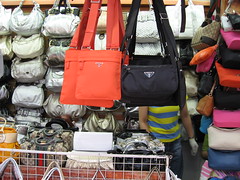
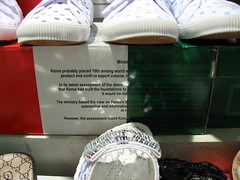 It seems that in the world of Korean marketing, anything goes, and what certainly is devalued is the truth; I've got to a stage where I don't believe anything I read in Korea about any product. I don't know if I'm supposed to laugh it off or feel concern at the idea of a society where the line between what is true and what is not is not merely blurred, it's not even cared about. Meanwhile, at some macro level, I'm sure the government wants to ensure that the brand 'Korea' engenders trust around the world...
It seems that in the world of Korean marketing, anything goes, and what certainly is devalued is the truth; I've got to a stage where I don't believe anything I read in Korea about any product. I don't know if I'm supposed to laugh it off or feel concern at the idea of a society where the line between what is true and what is not is not merely blurred, it's not even cared about. Meanwhile, at some macro level, I'm sure the government wants to ensure that the brand 'Korea' engenders trust around the world...
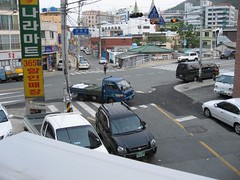 I have to let off some steam, but not because it's still hot, although it is. I'd like to take back what I wrote on Thursday about being woken up from 0730 in the morning by unsociable blue-van based street hawkers armed with their loudspeakers, irritating voices and bizarre sales pitches on a tape-loop. Because this morning, this guy was crawling round our apartment block at 0530 - 5mph - giving me more than ample time to get up, open the window fully, reach for a weapon and take a shot. Unfortunately, until Canon see fit to arm their cameras with microwave beams, my chances of burning out his electrics with my IXUS 800 are about zero. Still, at least this way I know I didn't dream it.
I have to let off some steam, but not because it's still hot, although it is. I'd like to take back what I wrote on Thursday about being woken up from 0730 in the morning by unsociable blue-van based street hawkers armed with their loudspeakers, irritating voices and bizarre sales pitches on a tape-loop. Because this morning, this guy was crawling round our apartment block at 0530 - 5mph - giving me more than ample time to get up, open the window fully, reach for a weapon and take a shot. Unfortunately, until Canon see fit to arm their cameras with microwave beams, my chances of burning out his electrics with my IXUS 800 are about zero. Still, at least this way I know I didn't dream it.
And what was he selling? Salt. Just who, exactly, is buying frakking salt at 0530 in the morning? That's what I want to know.
Some people will tell you about the importance many Asian cultures place on the ideal of maintaining social harmony, but I haven't seen too much of that in evidence here. What goes through someone's head to make them think that driving round apartment blocks with a loudspeaker so early is in any way socially acceptable? Aren't there are laws against this? It's amazing you can't get any peace in a country which is allegedly so heavily Buddhist influenced.
But... I think the truth is that this society brainwashes its people into accepting rampant commercialism and the shadier practices which go along with it, and if that means sellers have a right to wake you up at 0530 then so be it. You might even notice that the lamp-posts in the photograph are all plastered with adverts - it's rare to see one that isn't. Sometimes it seems like everyone's selling something.
Anyway, this guy better not be a Buddhist otherwise at this rate I reckon he'll be coming back in the next life as a cockroach.
Yesterday was Buddha's birthday, but I didn't get him a card because cards are so hard to come by here. Koreans don't tend to buy each other cards for birthdays, which perhaps confirms my suspicions about the emergence of parents' day. Instead, a trip to a local temple called Neungeum (능음사) was on the schedule.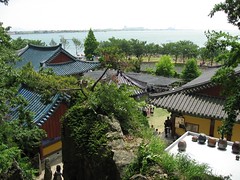
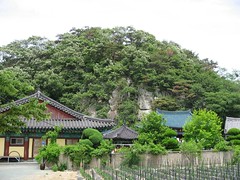
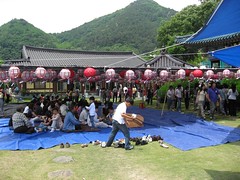 The temple was crowded which was little surprise because 'Buddha's Birthday' is a public holiday and, in fact, a great many of the shops in our district were closed for probably the first time since the Lunar New Year, though a few still plied their trade - perhaps they were the Christian ones? Indeed, the usually frantic roads on the way were similarly subdued. However, the Korean sense of urgency so lacking elsewhere was in plentiful supply within the temple grounds, where I repeatedly had to move aside lest I be barged out of the way by anxious ajummas intent on beating everyone else to each shrine in turn - or maybe just beating everyone.
The temple was crowded which was little surprise because 'Buddha's Birthday' is a public holiday and, in fact, a great many of the shops in our district were closed for probably the first time since the Lunar New Year, though a few still plied their trade - perhaps they were the Christian ones? Indeed, the usually frantic roads on the way were similarly subdued. However, the Korean sense of urgency so lacking elsewhere was in plentiful supply within the temple grounds, where I repeatedly had to move aside lest I be barged out of the way by anxious ajummas intent on beating everyone else to each shrine in turn - or maybe just beating everyone.
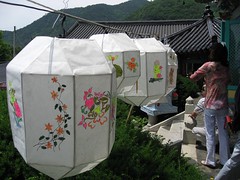
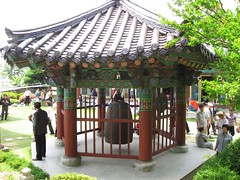
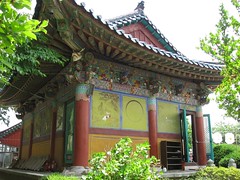 Neungeum is an unusual temple in that it sits next to the sea in the outskirts of Busan - or at least what would class as being the outskirts if the city ever seemed to end. Every other temple I've been to in Korea - and while I haven't been counting it's certainly enough to last a good many years - has been up a mountain. Admittedly some are quite small mountains, but one nevertheless gets the impression that, on the whole, monks prefer their elevated retreats. In fact, there's a very good reason for this as their favour has ebbed and flowed through history, and in the periods when they were persona non grata in social and political circles these literally were the places where they hid away until society wanted them again.
Neungeum is an unusual temple in that it sits next to the sea in the outskirts of Busan - or at least what would class as being the outskirts if the city ever seemed to end. Every other temple I've been to in Korea - and while I haven't been counting it's certainly enough to last a good many years - has been up a mountain. Admittedly some are quite small mountains, but one nevertheless gets the impression that, on the whole, monks prefer their elevated retreats. In fact, there's a very good reason for this as their favour has ebbed and flowed through history, and in the periods when they were persona non grata in social and political circles these literally were the places where they hid away until society wanted them again.
When a temple offers you food it seems you're morally obliged to eat, and this being Buddha's Birthday, food is very much on the agenda. So one of the larger temple buildings was full of people eating lunch, but we ate in at spill-over area outside, which was fine by me because it was hot. Next to us an outdoor kitchen cooked while a production line of people washed plates by rinsing them in a progressively cleaner set of tubs until they were probably usable again. From the car park to the food hall there were certainly a lot of hands helping out from the very old to the very young - apparently it's a big volunteer thing here on days like this. When we left, we got these small gifts of rice cakes ('떡') at the gate to take away. They look really great but the taste is perhaps an acquired one.
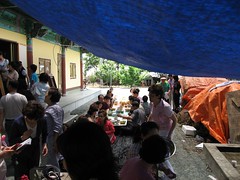
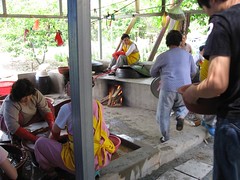
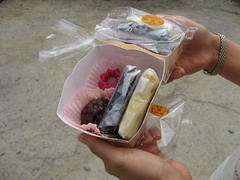 Building your temple by the sea, and at the end of the barrel of an angry looking channel (at least it felt angry - the wind was brisk), has its disadvantages. It seems that last year the temple was flooded during typhoon season by a storm surge and the monks had to escape by climbing the nearby trees. Since then, all the buildings have been repainted and apart from a rather bedraggled looking adjacent field where the monks grow chillies there's little evidence that anything happened.
Building your temple by the sea, and at the end of the barrel of an angry looking channel (at least it felt angry - the wind was brisk), has its disadvantages. It seems that last year the temple was flooded during typhoon season by a storm surge and the monks had to escape by climbing the nearby trees. Since then, all the buildings have been repainted and apart from a rather bedraggled looking adjacent field where the monks grow chillies there's little evidence that anything happened.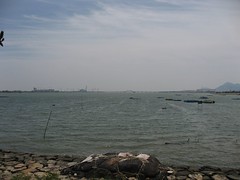
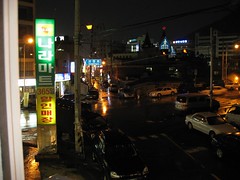 So about two weeks ago it got hot - or rather it became hot and humid - and it's the humidity that's the real killer. So even though there have been one or two cloudy days you still end up sweating after walking a short distance. Our air conditioner eats electricity and it isn't terribly effective. I've found I can't sleep at night and even our desert hamsters are drinking water in huge quantities and sleeping out in the open. I'm not much different.
So about two weeks ago it got hot - or rather it became hot and humid - and it's the humidity that's the real killer. So even though there have been one or two cloudy days you still end up sweating after walking a short distance. Our air conditioner eats electricity and it isn't terribly effective. I've found I can't sleep at night and even our desert hamsters are drinking water in huge quantities and sleeping out in the open. I'm not much different.
Just to exacerbate matters summer seems to have given carte blanche to the local street vendors to start selling their wares from seven thirty in the morning, via loudspeakers, from parked positions next to our apartment building. This does not really fit with my going to bed at two in the morning, but at least when one seller was roaming the streets at one a.m. yelling '찹쌀떡' (rice cakes) at the top of his voice it didn't bother me. I don't know how everyone else takes it though. The heat and the early morning loudspeakers are becoming a real problem, and I'm becoming too exhausted to think clearly.
Rain was forecast for today, and it finally came in the evening, but it didn't get much cooler. A few more weeks of this and then I'm told that the 'real summer' will begin. Great. Plus the monsoon season and typhoon season. Given that we're on a flood plain near the sea this does at least offer the possibility of shutting up those early vendors, although I suspect if the street outside is ever submerged they'll just take to selling from boats. They're resourceful like that.
We were walking along the side of the major road through our area yesterday after lunch when the crowd suddenly parted to reveal a fist-fight in full progress outside one of the shops. Other pedestrians did their best to step around the mêlée and it didn't seem an opportune time to pull out my camera and record the proceedings. As we were about to cross the road by going through an underpass I thought I might take a shot from the other side, but when we got there it had thankfully dissipated.
On her way back from Namhae in afternoon, Korean Mother saw two men fighting in the bus station. This time it wasn't just fists that were flying, but feet as well. This is, presumably, the downside of the prevalence of Taekwondo in Korean society and military training.
A friend of ours popped into a shop and left her car blocking an entrance for a couple of minutes - certainly not a well thought through decision. Sure enough, someone came along and found their passageway blocked. The result, when she tried to leave he blocked her car and refused to let her go. Since apologising didn't work and he was clearly so angry that he was prepared to continue for a very long time the police eventually had to be called - much to his disbelief and rage. The police had to physically restrain him while she drove away.
Recently there was an accident on the road right by our apartment. It wasn't a particularly bad one but there was some damage to one of the cars, though not the other as far as we could tell. The drivers argued on the road for an hour, occasionally breaking off presumably to call 'their people' before resuming the debate. We couldn't help but keep an eye on the unfolding drama as it began to take on an almost surreal quality. Eventually friends and family from both sides turned up and someone sensibly decided to call the police before a riot broke out. The police spent another hour at the accident scene, largely keeping the two drivers and their friends apart, though they tried to maintain the shouting match over the policemen's heads.
For six months here everyone seemed reasonably calm, if prone to a little Korean drama on occasions, but suddenly it seems as though there are arguments and fights breaking out left, right and centre. I've wondered whether it was just because I wasn't paying attention before but that isn't it; things like this you notice even if you're fresh off the plane. So I've come up with a theory - I think it might be the hot weather. In the last couple of weeks it's become hot - but more than that - oppressively humid. Certainly I'm beginning to notice the near constant sounds of car horns angrily competing for attention these days because we have the window wide open all the time, but it doesn't really account for everything else. So I'm wondering if the weather is pushing Koreans over the edge with irritability. On the other hand, maybe it is just coincidence, but then as they say, there have been a lot of coincidences lately.
Maybe they call this the Land of the Morning Calm because it's only in the afternoon that the fists start flying.
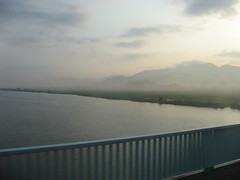 Z-0
Z-0
When you marry a Korean, it's not just an individual you marry. You marry the culture, the traditions, the attitude and of course, you most definitely marry the family. So any private sense of relief which you can have as a foreigner for not having to go through conscription as all Korean men do, quickly dissipates when you realise that in fact you have been conscripted after all - conscripted into the framework of responsibilities and obligations which will ensure your life is never quite your own for as long as you are here.
It creeps up on you. If anyone published a book on what these obligations are then I never saw it, so you're flying blind from day to day until your orders come in, wrapped in and begun by the façade of a civilian 'by the way'. So this week's 'by the way' was that Sunday was the 49th day since Korean Grandmother had died, and our presence was requested and required in Namhae to attend a remembrance ceremony. My wife didn't know about this requirement either, so it seems I'm not the only one discovering things on a need to know basis only. Apparently the fiftieth day is the culmination of minor ceremonies held every seven days for seven weeks which are designed to ensure the deceased will be enlightened and then reborn as a good person in a good next life.
Exhausted by an insomnia driven week behind me, and agitated by a sudden - if minor - Meniere's attack in bed at midnight, I arose at 0440 hours and by 0540 we were on our way to catch our 0620 bus. The roads were quiet, and some Korean girls with very short skirts stumbled around the road Shaun of the Dead style suggesting that they were still trying to find their way home from the night before. There were no men - they having presumably drunk themselves into oblivion many hours earlier. Our taxi was Warp 9 capable and violently bounced along at 100mph down a poorly constructed major highway which was never designed for anything above half this speed. At 0556 we took off and left the road momentarily, the wheels skidding like a plane landing as we reconnected with the tarmac beneath us. It was just like a Hollywood movie, the only thing missing was the sound of the siren behind us.
The bus to Namhae wasn't much better, but at least the driver appeared to have no aspirations towards obtaining his pilots licence that morning. I'd taken my anti-nausea tablet, my wife hadn't, and ironically it was her that was almost throwing up by the end of our journey.
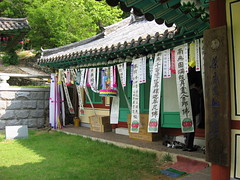
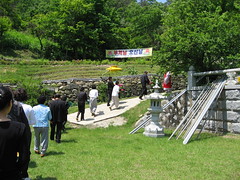
It wasn't long before we were at the temple - or one building of it at least, and a new and seemingly expensively finished one which still smelt of fresh wood. I also couldn't help noticing that we were the only grandchildren in attendance. It seems we are the oldest grandchildren which carries additional responsibility, and I think it's politics too. Even Korean Brother didn't attend. He's still working away, AWOL and I'm not sure he even knows about the death yet. So our peers got a free weekend pass, we didn't, and a whole new generation of rivalries was created.
The remembrance ceremony had been billed as a 'one-hour service'. A monk chanted, and it was calming. I have CDs of this stuff back home, now I had a live performance. An hour passed and I was OK, after ninety minutes boredom started to creep in and after two-and-a-half hours I'd decided to move to Canada. Booklets had the versus written down and at various points some audience participation was directed, and some mumbling could be heard. But the chants were in Chinese - albeit transcribed into Korean - so nobody knew what they were chanting for.
Somewhere along the way we'd burned incense sticks twice, done a couple of dozen big bows to the monk and makeshift shrine, where we also left offerings. Protocol dictates no photos inside of course, SOP. Afterwards, a procession led us up to a place where the paper flowers from the shrine were taken to be burned, along with some clothes.
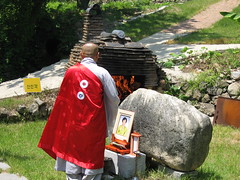
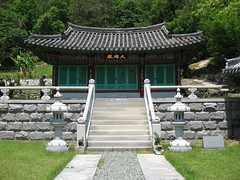
We ate lunch in a nearby temple building before embarking on the next stage of our journey - up the very narrow concrete mountain road to the cemetery where Korean Grandmother was buried.
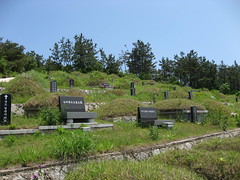
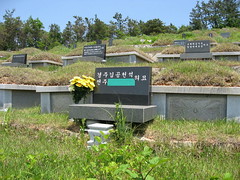
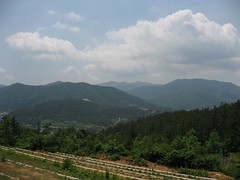
More big bows to Korean Grandmother - and Great Grandmother's graves were performed, and then it was back to the house. The senior officers were staying longer but this is where the junior ranks were demobbed for the day, so one of the Korean uncles gave us a ride to the station.
And what a ride it was. It turned out there was a reason why, just before leaving, Korean Father had urgently said "don't sit in the front". Suffice it to say, from here on, said uncle will be known as Uncle Road Rage. As we raced - the operative word - towards our possibly final destination, a succession of Western pop songs played from the radio. Between the speed and the hip-hop blasting from the speakers it occurred to me that all we needed were the guns and it was just like being back home. I also realised what had been bothering me up to that point was that this was the first time I'd heard Western chart music for over seven months. The Internet can keep you connected in certain ways, but you do miss out on other things perhaps without even realising.
It's not that Namhae is a terrible place, in fact it probably has a lot going for it if you want to get away from the chaos of the city and connect with a more peaceful community living more in balance with nature, but it's what it represents that I can't reconcile. When my grandfather died back home there was a funeral and generously, it took a morning. Maybe that's not enough, but Korean Grandmother's funeral has consumed three days - and that's the 'lite' version - the senior ranks have done much more. That's too much for something I married into. If that's harsh then yes I admit I'm not cut out for all these family responsibilities of death, life, festivals and ceremonies and I desperately need to feel I'm not always on duty. But Federer beat Nadal on clay for the first time in two years and my tennis-obsessed wife thinks that this is grandmother's reward for attending, so at least she got something out of it.
1600. Back at HQ. Awaiting further orders. Out.
When I lived in the UK I thought salespeople could be pushy. The moment you entered certain stores you could see them head in your direction and you'd have to fend them off with a well worn "we're just browsing thank you". In Korea, not only do salespeople descend on you rapidly, but there's a whole ritual to the entry. The moment you walk though the door you're greeted with "어서 오세요" (come in quickly), to which you may reply "네" (yes). The salesperson will usually give you a few seconds but the moment you glance at your first item, they're likely to be beside you, asking more about what you are looking for. When you leave, it's with a "안녕히 가세요" (go and have a safe journey) to which you'd normally reply "수고하세요" (keep up the good work).
Many shops in Korea are small. A few are incredibly small in fact - you might fit four or five customers into them. So when we walked into a small Korean clothes shop today it was especially noticeable that not only did the sole assistant not greet us, but she quickly turned her back towards us and began organising some items. I realised how Korea was changing my attitude - I would have been happy to be left alone back home but I guess I've been here long enough for it to feel almost rude. My wife felt the awkwardness even more and we quickly left. I think I'm being assimilated.
Z-1
In the supermarket the other day I spied a large soju bottle slowly working its way towards me, and I wasn't even drunk. Normally the people dressed this way can be found in the busiest areas of the city in the evening, luring those who probably need no encouragement into the various nearby bars. Finding one in my local Top-Mart though, was a bit of a surprise.
I've always wanted to get a photo of one, but holding up the Korean wave behind me while I turn around and snap something that's just dashed by has never led to good results. Finally I had the opportunity to take that elusive shot - and I lost my nerve; I was having one of those Invasion of the Body Snatchers days where I'd reached my quota of people perceived to be staring at me and I knew if I took my camera out I might as well have a big Korean neon sign above my head saying 'please disturb me'. But my attempts to remain my usual different colour of incognito predictably failed as the soju was magnetically attracted towards me. In a last desperate act, I employed the trusty wisdom of The Hitchhiker's Guide to the Galaxy, turned my back towards it, and hoped it would become somebody else's problem. A playful tap on the shoulder ended that fantasy.
It is a fact that wearing any kind of novelty costume automatically turns the wearer into a five-year-old, something I can only assume is related to the associated oxygen deprivation, so having captured my attention the soju bottle proceeded to wave at me manically. I mirrored the gesture, even though I knew the intended irony would go over his screw-top. And if they just think I'm playing along so be it - maybe they'll eventually let me go.
Fortunately, as my Korean language ability didn't extend to telling him there's nothing sadder than spending your life in a bottle the wave was as far as the communication went, but I was handed a free gift in lieu of monetary compensation for distress - a small packet with a picture of a soju bottle on it. Well that figures.
Korea has some odd ideas about packaging but as we endured the various gauntlets of supermarket staff shouting their wares at us it did vaguely bother me that the packet was too thin to have any significant quantity of soju, and on further investigation back home it was... drum roll please... a face mask, as in the kind you desperately wear at night when you get to the age where your face stops cleaning itself. It crossed my mind that perhaps this was a deliciously subversive move on the part of the sponsoring company - drink our soju and then stick this on your face afterwards because you'll certainly need it. But sadly not. It transpires that Korean companies often distribute free gifts which have no connection to their product whatsoever - it's merely an exercise in creating goodwill - taps on the shoulder from six-foot soju bottles notwithstanding.
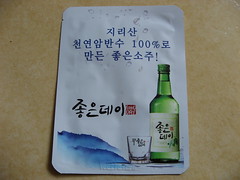
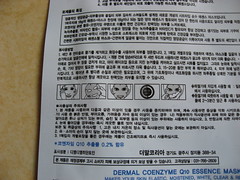 Z-2
Z-2
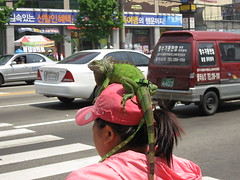 Excuse me but you appear to have an iguana on your head. I didn't notice it at first while waiting near you at the crossing, and when I did I briefly thought it was a very realistic if somewhat odd hat, but then it moved removing any doubts I had. It was only when I snatched my camera out that the woman next to you looked at what I was taking, cried the Korean equivalent of "oh shit!" and leaped away as fast as she could. You remained nonplussed or just oblivious to the sudden space you'd created around you and as the lights changed and calmly walked across the road as though having a reptile sat on top of you is the most natural thing in the world. I have to say it's a new experience for me and evidently for the woman who leaped away because she was still talking to herself about it in shocked and largely unrepeatable language as we reached the other side.
Excuse me but you appear to have an iguana on your head. I didn't notice it at first while waiting near you at the crossing, and when I did I briefly thought it was a very realistic if somewhat odd hat, but then it moved removing any doubts I had. It was only when I snatched my camera out that the woman next to you looked at what I was taking, cried the Korean equivalent of "oh shit!" and leaped away as fast as she could. You remained nonplussed or just oblivious to the sudden space you'd created around you and as the lights changed and calmly walked across the road as though having a reptile sat on top of you is the most natural thing in the world. I have to say it's a new experience for me and evidently for the woman who leaped away because she was still talking to herself about it in shocked and largely unrepeatable language as we reached the other side.
Z-4
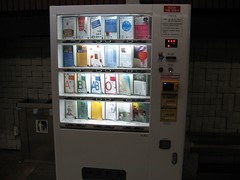 Most Koreans seem to sleep on the subway, at least part of the time - and little wonder, because aside from the impossibly busy lives they appear to lead, the daily commute in Busan is probably by subway, and even though the trains run like clockwork, it's still almost an hour from one end of the city to the other. While not many would probably make that journey, spending a significant portion of the day underground is a reality for many.
Most Koreans seem to sleep on the subway, at least part of the time - and little wonder, because aside from the impossibly busy lives they appear to lead, the daily commute in Busan is probably by subway, and even though the trains run like clockwork, it's still almost an hour from one end of the city to the other. While not many would probably make that journey, spending a significant portion of the day underground is a reality for many.
The transit authorities, or perhaps rampant capitalism, has done its best to provide distractions for its captive audience. Shops are common - in fact sometimes it's more appropriate to describe them as subterranean shopping centres, and of course, vending machines are everywhere.
So you can get drinks and all the usual things you would expect from a vending machine in the West, and fortunately as far as I can tell, none of the truly bizarre items that can be readily dispensed in Japan. This presents the occasional challenge to the Korean commuter, who faced with a sudden hunger or thirst can try to run to a machine, obtain an item, and run back to their carriage in the 15-20 seconds the trains invariably wait at a station. I'm assured it can be done. But, if the worst should happen, the next train will be along in six minutes.
There are some minor oddities. Hot drinks from cans which can be difficult to hold without burning yourself, and popcorn machines that are not uncommon although I've yet to see anyone eating the stuff on the train. While I dare say there are stranger things to be found it was a first when I discovered a book vending machine, which may be more of a rarity unless I haven't been paying attention. I couldn't make much of what was on offer for an unbelievably cheap 1,000 and 2,000 won (£0.54 and £1.09 respectively - admittedly, they are quite thin), but while still in Korean three books had the English names of their respective authors - Oprah Winfrey, Bill Gates and Warren Buffett. Now while Oprah Winfrey and Bill Gates might be light subway nap-time reading I wondered how many Koreans were reading the Essays of Warren Buffett on their way to work. Still, I'm impressed if they are.
Unfortunately although I can read Korean I'm a long way from understanding it so tempted as I was to something (yes, Buffett was tempting), I had to pass, and as I'm not much of a subway sleeper, I'll have to find other ways of amusing myself on my travels.
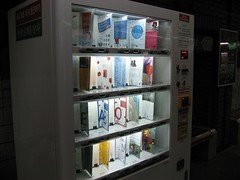 Z-5
Z-5
The other day my wife phoned the local outpost of a large international hotel chain to ask if their staff could speak English. "Yes", came the somewhat offended reply, "it's a requirement that all our staff can speak English". Afterwards I suggested that she should have then switched to English and asked some more questions, preferably difficult ones - even if they were slightly spurious - just to test them out since they were so obviously affronted by the question.
You see, it's been my experience in Korea that there are quite a lot of people who claim to speak English, but there's a huge difference between their imagined ability and their actual capacity to hold an intelligible conversation. It may partly be the fallout from the considerable exposure that Koreans have to English in their education system - one requirement for universities is to have learnt over a thousand English words as part of the entrance exam. However, while this style of learning may help vocabulary, it doesn't necessarily help the comprehension of sentences, and certainly not speaking and therefore conversing. This can manifest itself in some odd ways - one of my wife's friends - who does not claim to have any English ability - has such an impressive vocabulary that she often knows what I've said when I've spoken a short sentence - but she won't speak English to me voluntarily or even with some arm-twisting, so to the uninitiated foreigner she might appear to have no ability at all. I don't know how many Koreans are like this so I'm very careful about what I say in front of anybody.
But what of those who do make claims about their language skills to their Korean friends? I've noticed that when I appear on the scene they often can't get out of my way fast enough - lest their ability is put to the test. For example, I went to a particular hair salon a few times and everyone told me that one of the stylists was quite good with English, but every time I went in, it felt like he was avoiding me - until the day he was assigned to me, and he cut my hair in total silence. The experience is not untypical, but whether it's due to the individual over-selling themselves, or peers doing it for them, is hard to say. What I do know is that after seven months here I've been promised meetings with a number of people who speak English, and so far my enthusiastic friend at the bank is the only Korean apart from my wife I can claim to have had a conversation with in this time.
It's not that I'm criticising. It was a hard slog learning 1,200 Japanese words and my Korean is still stuck a little above 300 after a busy week, so anyone who can speak any English here has my respect. But it does feel like there's been some false advertising in certain quarters all the same. And that's why next time a hotel staff member - or anyone else for that matter - gets shirty about the question being asked, they're going to be called on it.
Now that the hot weather has well and truly arrived in Busan, I'm waiting for my war against the mosquito menace to resume. But when my wife discovered some hard black dropping-type objects in one of our cupboards under the sink this week, it was a different enemy we had to do battle with. Not being from these parts, or quite this kind of climate, I rather nonchalantly began to pull cleaning bottles and plastic bags while my wife - apparently as it turned out later knowing what to expect, bravely hid by the bed at the other end of the room. As the last bag was pulled, a large black object scuttled across the side of the enclosure causing me to call out to a well known religious figure to tell me what it was I'd just seen. But before a higher power could answer, my right hand autonomously discovered the mosquito spray and I was re-enacting Desert Storm, in my cupboard. I quickly learned that cockroaches are not particularly sensitive to mosquito spray.
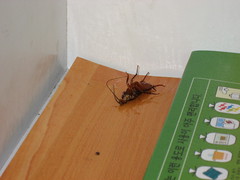 Victory was eventually secured when there was so much spray in the now closed cupboard that there was probably no oxygen left to breathe. We tentatively checked the other storage areas - more droppings - and another black shape seemed to shoot along the wall and up under the even darker areas of the sink. But was it real or imagined? So more cautiously this time, I removed the cupboard's contents and liberally sprayed inside. About five minutes later, and yes, there was a second cockroach, which emerged from behind the cooking range and proceeded to walk the entire length of the kitchen area - we couldn't spray it for fear of getting insecticide all over our plates and utensils - before climbing onto our jade tree at the other end. We waited, eyeing its wing-tips nervously. If it took flight - I'd resolved to empty most of the rest of the can of mosquito spray towards it, but fortunately it was already sufficiently stunned to fall off the plant onto the floor. Then it got a good spray, and although it appeared as impervious to the chemicals as the first, I think it eventually drowned.
Victory was eventually secured when there was so much spray in the now closed cupboard that there was probably no oxygen left to breathe. We tentatively checked the other storage areas - more droppings - and another black shape seemed to shoot along the wall and up under the even darker areas of the sink. But was it real or imagined? So more cautiously this time, I removed the cupboard's contents and liberally sprayed inside. About five minutes later, and yes, there was a second cockroach, which emerged from behind the cooking range and proceeded to walk the entire length of the kitchen area - we couldn't spray it for fear of getting insecticide all over our plates and utensils - before climbing onto our jade tree at the other end. We waited, eyeing its wing-tips nervously. If it took flight - I'd resolved to empty most of the rest of the can of mosquito spray towards it, but fortunately it was already sufficiently stunned to fall off the plant onto the floor. Then it got a good spray, and although it appeared as impervious to the chemicals as the first, I think it eventually drowned.
Having read that cockroaches can hold their breath for forty-five minutes, we nervously disposed of the bodies thinking that they might be faking or merely stunned, but they were definitely dead. After we'd cleaned, we gained access to the area beneath the units and I taped up any obvious holes in the floor. I'm guessing they came in through a gap around the pipes. The next day we bought cockroach poison which should be effective for three months, and a more appropriate - and hopefully effective - spray.
When I'd awoken that morning I thought I heard some rustling noises coming from the other side of the room - but I assumed it was our hamsters. Now I'm not so sure. Sleep light, it's going to be a long summer.
 We went to the second school to exercise Monday evening via the local 'entertainment area', which I'd like to emphasise is not a red light district, and any similarities are, as they say, entirely coincidental.
We went to the second school to exercise Monday evening via the local 'entertainment area', which I'd like to emphasise is not a red light district, and any similarities are, as they say, entirely coincidental.
Even before we got there, Korean Mother had pointed out a couple of 'Norae Bangs' (singing rooms), featuring pictures of women who appeared to have mislaid most of their clothes. I'd passed by them a few times before without noticing, which either means I'm getting old or otherwise I've developed Korean-Ad-Blindness - a condition brought about by over exposure to in your face advertising (highly likely).
Taking a turn down a narrow side-street off a major route through Busan, we were confronted by the site of a particularly aggressive canyon of neon lights and brightly lit pictures, but while many such roads concern themselves with selling you food, this one rapidly revealed its difference - a preponderance of pictures of wardrobe-challenged females with various enticing slogans suggesting their... availability - for singing.
Yes, this 'entertainment area' is mostly comprised of singing rooms where lonely men in need of a good vocal workout can share their happy experience with willing females provided by the venue. There is nothing more to it than that, and should the supplied companion choose to accompany her singing partner after work in further activities later beyond the premises that is not the business of her employer. Whatever they do in their private time, they must be very good singers because, as the rightmost picture below intriguingly proclaims, above the picture of the somewhat wardrobe-challenged woman: "Your night will be blown away".
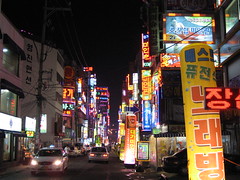
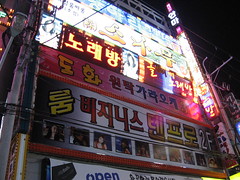
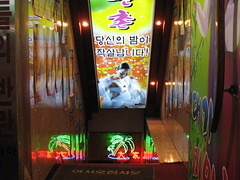
In fact women feature in much of the particularly heavy singing room advertising in this area, but striking a blow for equality a couple of the establishments advertise themselves as "women only" (picture below right). Here, apparently, it's male vocal companionship which is provided. For unknown purposes, several rather muscular looking Korean men stood outside some of the establishments, and between this and wishing to avoid recording the image of any Korean gentleman who perhaps may have told his wife he was working late at the office, the task of taking photos was far from straightforward. But I suspect my attempts to appear inconspicuous were an absurd failure given that I was probably the only foreigner in the district.
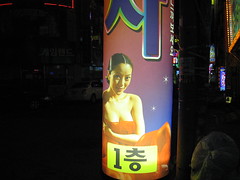
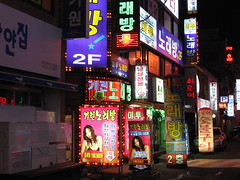
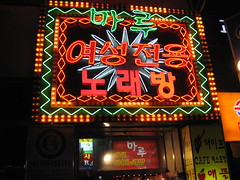 Aside from the Norae Bangs, the area has a few bars, a couple of ordinary looking coffee shops, and in a surreal twist, a post office. But no barbershops. Another oddity - bouncer-type individuals aside - was the otherwise ordinariness of the streets. A mother walked with her children, some elderly people shuffled their way along, young men strolled hand-in-hand with their dates (perhaps with some subliminal motive), as though they were oblivious to the imagery around them, and perhaps so, even if a brief glance inside many of the entrances will reveal topless photos, along with pictures of barely clothed bottoms proclaiming "Business!".
Aside from the Norae Bangs, the area has a few bars, a couple of ordinary looking coffee shops, and in a surreal twist, a post office. But no barbershops. Another oddity - bouncer-type individuals aside - was the otherwise ordinariness of the streets. A mother walked with her children, some elderly people shuffled their way along, young men strolled hand-in-hand with their dates (perhaps with some subliminal motive), as though they were oblivious to the imagery around them, and perhaps so, even if a brief glance inside many of the entrances will reveal topless photos, along with pictures of barely clothed bottoms proclaiming "Business!".
The street leading into the area may be on a major route through Busan, but from the other side of road it looks like just another consumer trap like thousands of others in the city. But it's not that the business and imagery of companionship is confined to its borders. Korean Mother pointed out a couple of other establishments nestled down side-streets on our way home, and the next day, on the main road and the middle of the local shopping district, I noticed some interesting advertising taped to the ground.
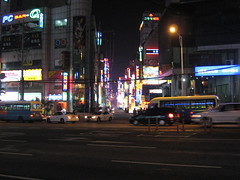
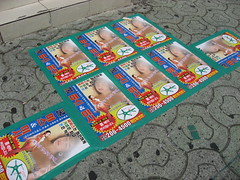
A couple of example photos which are not safe for work due to nudity, are here and here. While children may be able to walk by this kind of thing on the street (not to mention the '19-rated' programmes shown on TV during the daytime), when it comes to doing some research on certain terms using Korean search engine Naver, what you get is this, so you can't put into the Internet what appears in three-foot high neon letters on a Busan street - an interesting Korean dichotomy of censorship.
The night before our medical Korean Mother made one of her regular visits to our apartment, but thinking we were bored she persuaded us to come out and exercise with her. It was 9pm, and quite dark. Feeling the desperate and likely futile need to work off as much excess body weight as possible before the next day, we agreed, though I had little idea of what lay in store.
We made our way to a nearby school where, she assured us, people would be exercising in the grounds outside. My scepticism was confirmed when we reached the locked gates and the empty space beyond. Apparently they close at nine. Not to be deterred, she insisted on trying another school, which we reached via a rather interesting route. She had more luck with this school - it had no gates - and sure enough, as my eyes adjusted to the darkness of the all-weather pitch in front of the main building, I could make out shadowy figures moving in lines around its perimeter, in one of the more surreal sights I've seen in Korea which seemed straight out of a horror movie. I tried to take pictures, although most were blurred as there really wasn't a lot for the camera to focus on - although one clear shot on an appropriate ISO shows the scene - even if it is artificially light. The second photo here is a better depiction of the level of darkness, even if it is a little blurred.
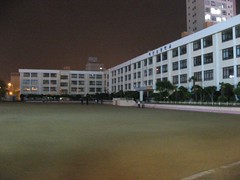
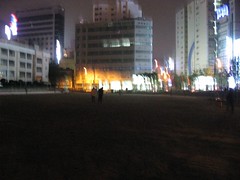 It seems that in addition to people coming here in the morning before school starts, they come here afterwards, walking quickly around the playing pitch using its border lines as a track of sorts. There are also a few pieces of exercise equipment along one of the edges, which could also be utilised.
It seems that in addition to people coming here in the morning before school starts, they come here afterwards, walking quickly around the playing pitch using its border lines as a track of sorts. There are also a few pieces of exercise equipment along one of the edges, which could also be utilised.
We did nine and a half fast laps of the pitch (we cheated towards the end to beat Korean Mother who'd embarrassingly pulled ahead of us), working up quite a sweat.
I couldn't imagine such a thing happening back home - it's just asking to be mugged or worse - but here it's fine on the whole, and by all accounts a fairly common sight if you know where to look. Most of the shadowy figures were elderly - though not all - and in a reminder of life back in England, and a suggestion that not all is as it sometimes seems in Korea, four obviously under-age youths passed by to lurk in a particularly dark corner of the school building - where shortly after four tell-tale red dots in the distant darkness told its own story of non-adrenalin based addictions in this society.
In the UK any car over three years old has to pass an annual test to ensure that it's roadworthy. This is often where early problems are picked up - or made up - depending on the type of auto shop/garage you end up going to. For a long time it used to be cheap at around £20 - but like a lot of stealth taxes back home in the last few years it's managed to leap up to £50. Still, getting a clean bill of health for your car tends to be a lot cheaper than getting one for your body; an annual medical can cost anything from £500 to well over a thousand. This tends to act as a disincentive and most people try to see a the doctor when a problem develops. It's an open question as to whether the Government bean-counters (next door to the Ministry of Massive Bureaucratic Waste) think treatment rather than prevention is cheaper.
It's been my experience so far in Korea, that waiting until something is wrong to go see the doctor is seen as being rather foolish, and annual check-ups are positively encouraged by the Korean health service, particularly as you get older which is when the annual summonses for medicals start to land in your post box. Of course, you don't have to go, but why wouldn't you? And while I'm not yet at that age, there was still the sense of expectation within Korean Family that I would go along with Korean Mother and Korean Wife when they went, and volunteered themselves respectively, for a diagnostic session. It's hard to argue against something which appears inherently sensible, so we chose today since it's a public holiday in London (a late May Day), the stock market there is closed, and we took the day off.
It may be perfectly natural for a Korean to sit down in front of the doctor and report that they have no problems, but I have to say I felt rather foolish about it, expecting him to ask at any moment why on Earth I was there. But this is Korea, and they don't think like that. I searched his face for signs of disappointment at least, but saw none. This may not be China, but inscrutability is still a virtue here, usually.
So I'm presented with a menu of procedures and some recommendations and yes, I'll have the chest X-ray for starters, followed by an ECG test, blood test, urine test and abdominal ultrasound for dessert. I pass on the camera in the stomach and the prostrate cancer test, as I'm trying to cut down. My wife mentions that I've had some shoulder trouble, but I don't need to speak Korean to recognise the universally translatable reply of "yeah whatever" from the doctor - this is an internal organs hospital (all three floors of a small office building's worth of it) and they don't do all that voodoo orthopaedic nonsense here.
So the total cost of my medical came to 38,000 won - about £21. I pay around £7.40 per month in Government-run health insurance. In the UK we pay 11% of our salary in National Insurance covering health, unemployment and pensions, but given that this figure runs to over two-hundred pounds a month on an average salary my guess is that the British health service is taking a lot more than several pounds. Oh, and comprehensive preventative medicals are very much not part of the service (go to a private hospital for that).
It's my second ECG of the year and around my eighth X-ray since arriving, so it's beginning to feel a bit like overkill - no pun intended. I'll have to watch the X-rays in future because I think I'm beginning to develop a half-life. I had to humour them, although the joke ended up being on me when they found a minor heart problem that hadn't shown up the previous time. The attempt to instil some hypochondria in me failed and it was my turn to shrug my shoulders and do the "yeah whatever" thing because I've suspected it for years and it's not a big deal. But you have to give them full marks for spotting something the British NHS probably passed over at every available opportunity - and this is what the whole prevention mentality is all about of course. I should get more exercise and try and avoid too much stress. I'm a stock market trader working a sixty hour week in a foreign country where I don't speak the language - less stress is not going to happen.
Incidentally, Wikipedia currently describes the NHS as being the fourth biggest employer in the world after the Chinese Army, Indian Railways and Wal-mart, and oddly enough, if those three organisations ever merged I think the result would be something very much resembling the British National Health Service. I suspect from the complete lack of any apparent bureaucracy in Korean hospitals they are unlikely to figure highly in world employment leagues - most people seem to be doctors and nurses rather than administrators and accountants.
Our little Korean medical centre did give me a taste of home though - the whole process took over four hours and I split vast quantities of time between reading an Alan Booth travelogue and staring at the wall pondering life, though at least the paint job was better than in the hospitals of the NHS - it looked like it had been done during my lifetime.
Tuesday is Parents' Day in Korea - until 1973 it was known as Mothers' Day but rather than create an extra Fathers' Day they rolled everything into one instead and gave it a more encompassing name. I guess the greetings card lobby isn't very strong here.
In fact, we don't have to buy a card at all for Parents' Day, but rather needed to find a carnation - the traditional flower given to parents for the occasion. As yesterday was Children's Day, tradition suggested that Korean Parents take us out somewhere, so in an ironic twist, we ventured out to a well-known flower market with Korean Mother a couple of miles away from our area to look for carnations and a new plant for her apartment. But while the market might be well known, the route to it - which took us through a dingy industrial estate largely concerned with processing vegetables (and animals judging from the smell) - should ensure it stays well off the tourist trail.
While there were a few species I hadn't seen before, much of what was on sale was what I'd expect to find in a garden centre back home - I suppose that's plant globalisation for you. But there are subtle differences.
When I first saw my Korean Parents' apartment - one of the first things which struck me was the quantity of foliage Korean Mother had amassed. The small plants were one thing - but it didn't stop there - the largest two were eight feet tall trees. I'm sure they'd grow taller if they hadn't hit the ceiling already. So the Korean flower market sells a lot of small trees - because Korean Mother isn't the only one that likes squeezing them in their apartment. That's all well and good, but I'm slightly perplexed about how they get them through the door.
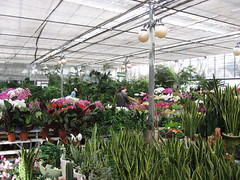
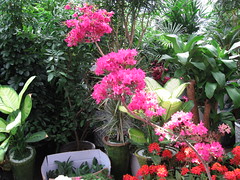
A couple of smaller trees were of interest, but Korean Mother turned her nose up at the price of 300,000 won - £162, and I was staggered, because they really didn't look like they justified the cost. That was nothing though, as many of the larger plants ran into several hundreds of pounds - and this market had a reputation for being cheap. People pay these prices though, so I guess you could derive from this that there's a certain section of Korean society which takes their greenery very seriously indeed.
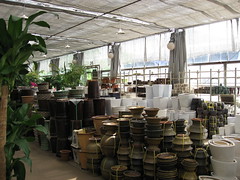
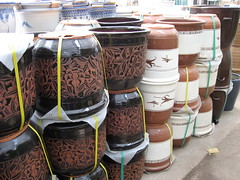
Big plants require big heavy pots, and there were plenty for sale - though they often feature designs which I suspect wouldn't be to the taste of people back home, even if they put trees in their apartments, which hasn't been my experience. Combination plant/humidifier arrangements are also on sale for Korea's dry atmosphere. I see a lot of these in restaurants here and from experience I suspect they're rather useful in the dry winters. While I find they have a certain aesthetically pleasing quality, the effect is somewhat diminished by the inclusion of changing coloured lights in some of them resulting in a disco-style effect.
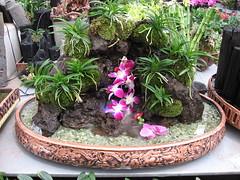
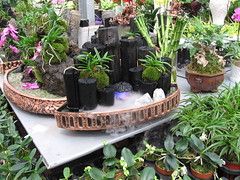 Korean Mother found a plant she liked and haggled the owner down from 50,000 won to 45,000, plus a free 'money tree', which once selected, magically turned into two free money trees after some additional haggling. How you can haggle over a free item is beyond me but clearly Korean Mother relishes the challenge. The owner of this particular store within the market was left shaking his head at this tough 'ajumma', and I felt rather sorry for him because even though I don't understand Korean, I swear she usually destroys their will to fight somewhere among the sentences. Or perhaps she's using some kind of Jedi Mind Trick. We were still standing outside when the next 'ajumma' came along and the owner quickly told her how the last person that had offered him less than 50,000 won for such a plant went home empty handed... but he really refused to lower the price this time.
Korean Mother found a plant she liked and haggled the owner down from 50,000 won to 45,000, plus a free 'money tree', which once selected, magically turned into two free money trees after some additional haggling. How you can haggle over a free item is beyond me but clearly Korean Mother relishes the challenge. The owner of this particular store within the market was left shaking his head at this tough 'ajumma', and I felt rather sorry for him because even though I don't understand Korean, I swear she usually destroys their will to fight somewhere among the sentences. Or perhaps she's using some kind of Jedi Mind Trick. We were still standing outside when the next 'ajumma' came along and the owner quickly told her how the last person that had offered him less than 50,000 won for such a plant went home empty handed... but he really refused to lower the price this time.
We paid for the plant and beyond the token carnation this is Korean Mother's Parents' Day gift sorted out - we still have Korean Father to worry about, but since he is away in Namhae until Tuesday this buys us more time to think.
 After we ran out of our supply of maeshilcha ('매실차') in early March, I managed to minimise my withdrawal symptoms by buying bottles of I Can't Believe It's Not Maeshil from the supermarket. OK, this isn't the actually brand name, but compared to the thick home-made version which Korean Mother cooks up annually, it's a poor imitation. To be fair it's more of a juice than a concentrated tea, but it doesn't give you quite the same kick.
After we ran out of our supply of maeshilcha ('매실차') in early March, I managed to minimise my withdrawal symptoms by buying bottles of I Can't Believe It's Not Maeshil from the supermarket. OK, this isn't the actually brand name, but compared to the thick home-made version which Korean Mother cooks up annually, it's a poor imitation. To be fair it's more of a juice than a concentrated tea, but it doesn't give you quite the same kick.




















































